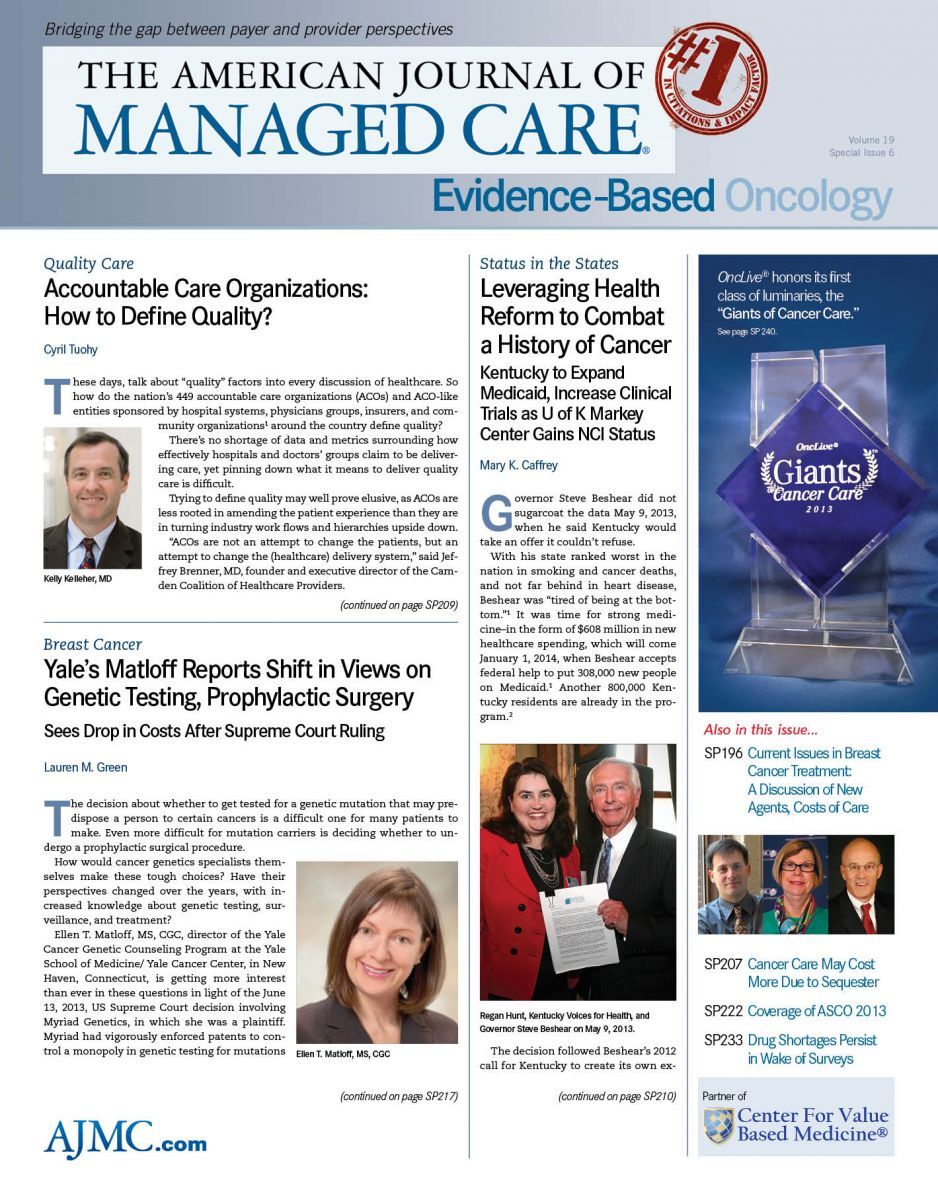- Center on Health Equity & Access
- Clinical
- Health Care Cost
- Health Care Delivery
- Insurance
- Policy
- Technology
- Value-Based Care
Predicting Treatment Outcomes in Older Adults With AML
Older adults represent the majority of the more than 1.5 million people diagnosed with cancer each year. Unfortunately, significantly fewer older adults are enrolled on clinical trials, resulting in limited information regarding the risks and benefits of standard cancer therapies in the elderly. While chemotherapy is offered increasingly as part of cancer treatment to older adults, it is known that chemotherapeutic side effects can increase significantly with age.
These side effects may result in loss of independence and impaired quality of life. However, among older adults of the same chronologic age, an individual patient’s ability to withstand the rigors of cancer treatment may differ widely. As a result, some older adults may tolerate and benefit from aggressive therapies similar to younger patients, while others may not. Measurable patient characteristics that predict better tolerance have not been widely studied and are desperately needed in clinical practice to inform treatment decision-making and individualize care for each older adult. The field of geriatric oncology has developed in part to address this need.
A major research focus within the field is to develop and test the utility of practical assessment strategies that predict tolerance and benefit to standard therapies. Nowhere is the uncertainty regarding optional treatment for older adults more prominent than in the setting of acute myelogenous leukemia (AML). Due to the morbidity of the disease and intensity of treatment, AML represents one of the most dramatic examples of age-related outcome disparity in oncology. Older adults represent more than half of new cases of AML and experience significantly inferior outcomes with higher rates of treatment-associated morbidity and mortality and lower overall survival. However, clinical trials have shown repeatedly that selected older adults can tolerate intensive therapy and experience long-term survival when treated in a similar fashion to middle-aged adults. The difficulty is identifying those patients who are likely to benefit from intensive treatments at the time of diagnosis.
Treatment recommendations for older adults range widely and are often based to a larger extent on chronologic age. Research focused on identifying those older adults more likely to benefit from treatment has primarily focused on age-related alterations in tumor biology. Few studies have evaluated patient-specific characteristics such as comorbid conditions, functional status, and cognitive status, all of which may be equally important in determining treatment tolerance.
To address this issue, we designed a study focused specifically on older adults with AML to test the utility of bedside geriatric assessment in predicting treatment outcomes. This study drew on the strengths of Wake Forest Baptist Health as a leukemia referral center, with robust geriatric and cancer research programs. In this observational study of 74 older adults who were treated intensively for their AML, we investigated the predictive value of a bedside geriatric assessment on overall survival. The geriatric assessment was composed of several brief questionnaires and physical performance tests, which were designed to measure physical function by self-report and objective evaluation, cognition, mood (depression and distress), and comorbidity.
We were particularly interested in the utility of objective physical function testing, which minimizes biases associated with self-report and allows for standardization of measurements. The physical performance measures used included the short physical performance battery (a brief 4-meter walk, repeated chair stands, and balance testing) and grip strength. The entire assessment was administered in approximately 30 to 40 minutes by a nurse prior to initiation of intensive chemotherapy. The primary outcome of the study was overall survival. After adjusting for clinical and biological factors known to be associated with survival in older patients with AML, we found that both impairment on the cognition screen and impaired objectively measured physical performance were independently associated with worse survival in this cohort.
This is the first study to evaluate the role of cognition or physical performance in this setting. It is important to note that all patients enrolled on this study were already highly selected and deemed fit for intensive therapy by standard oncology assessment strategies. In this setting, assessments of cognition and physical performance were able to detect vulnerability that might otherwise be undetected and yet is clinically significant. Multisite studies to validate the utility of geriatric assessment in the setting of therapy for AML are ongoing in the Alliance cooperative group. If validated, simple assessment measures of physical function and/or cognition may be used to help further individualize treatment decision making for older adults in clinical practice. Identifying characteristics that predict vulnerability to excessive toxicity may inform future clinical trial design by facilitating the development of treatment strategies specifically for vulnerable or frail older adults.
Finally, this research may inform interventions to address vulnerability. Building upon our observational study that showed the prognostic significance of lower physical performance at diagnosis, we have developed a physical activity intervention to minimize functional decline associated with intensive therapy. The goal of this work is to develop active strategies to prevent functional decline during treatment that will maximize treatment benefits and quality of life.

Exploring Racial, Ethnic Disparities in Cancer Care Prior Authorization Decisions
October 24th 2024On this episode of Managed Care Cast, we're talking with the author of a study published in the October 2024 issue of The American Journal of Managed Care® that explored prior authorization decisions in cancer care by race and ethnicity for commercially insured patients.
Listen
HEDIS Glycemic Goal Achieved Using Control-IQ Technology
December 22nd 2025A greater proportion of patients with type 1 diabetes who used automated insulin delivery systems vs multiple daily injections achieved the Healthcare Effectiveness Data and Information Set (HEDIS) glycemic measure.
Read More

